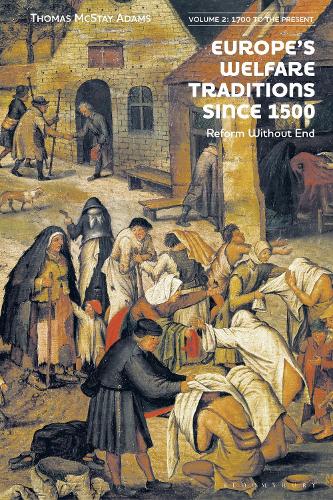
Europes Welfare Traditions Since 1500, Volume 2: 1700-2000
(Hardback)
Available Formats
Publishing Details
Europes Welfare Traditions Since 1500, Volume 2: 1700-2000
By (Author) Thomas McStay Adams
Bloomsbury Publishing PLC
Bloomsbury Academic
23rd February 2023
United Kingdom
Classifications
Professional and Scholarly
Non Fiction
Social and cultural history
Social welfare, social policy and social services
330.126
Physical Properties
Hardback
464
Width 156mm, Height 234mm
Description
Tracing the interwoven traditions of modern welfare states in Europe over five centuries, Thomas McStay Adams explores social welfare from Portugal, France, and Italy to Britain, Belgium and Germany. He shows that the provision of assistance to those in need has faced recognizably similar challenges from the 16th century through to the present: how to allocate aid equitably (and with dignity); how to give support without undermining autonomy (and motivation); and how to balance private and public spheres of action and responsibility. Across two authoritative volumes, Adams reveals how social welfare administrators, critics, and improvers have engaged in a constant exchange of models and experience locally and across Europe. The narrative begins with the founding of the Casa da Misericordia of Lisbon in 1498, a model replicated throughout Portugal and its empire, and ends with the relaunch of a social agenda for the European Union at the meeting of the Council of Europe in Lisbon in 2000. Volume 1, which focuses on the period from 1500 to 1700, discusses the concepts of welfare and tradition. It looks at how 16th-century humanists joined with merchants and lawyers to renew traditional charity in distinctly modern forms, and how the discipline of religious reform affected the exercise of political authority and the promotion of economic productivity. Volume 2 examines 18th-century bienfaisance which secularized a Christian humanist notion of beneficence, producing new and sharply contested assertions of social citizenship. It goes on to consider how national struggles to establish comprehensive welfare states since the second half of the 19th century built on the power of the vote as politicians, pushed by activists and advised by experts, appealed to a growing class of industrial workers. Lastly, it looks at how 20th-century welfare states addressed aspirations for social citizenship while the institutional framework for European economic cooperation came to fruition
Reviews
This is a breathtaking piece of work explaining the long historical roots of todays European welfare states. Thomas M. Adams successfully - guides his reader through more than 300 years of European welfare traditions. This is quite an achievement and a must-read for everybody wanting to understand the welfare state. * Klaus Petersen, Professor of History and Director of Danish Centre for Welfare Studies, University of Southern Denmark, Denmark *
Author Bio
Thomas McStay Adams is an independent scholar and a retired Senior Program Officer for the National Endowment for the Humanities, USA. He is the author of Bureaucrats and Beggars: French Social Policy in the Age of the Enlightenment (1990).
